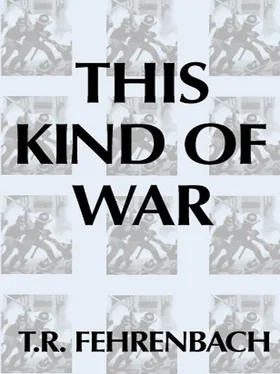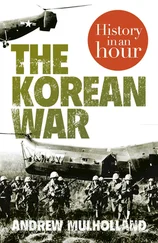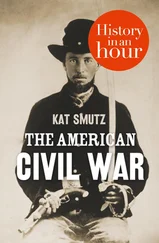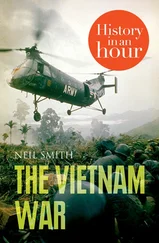Red-eyed, smoking too much, young Senior Colonel Lee waited now in his Operations Post, listening to the torrential showers of the beginning monsoon slash down into the green paddies outside, smelling the pungent odors of earth and fertilizer the rains released. He was tired, but he was also spring-tight with a disciplined excitement, waiting for the hours to pass. He looked at his cheap watch. He did not have long to wait.
The orders had gone out, and he knew they would be obeyed. Aside from its fanatical core of Russian-and Chinese-trained veterans, there were many conscripts, rice Communists, in the ranks of the Inmun Gun. But even these men would obey.
Hesitancy, in the Inmun Gun, was cured neatly, efficiently, and permanently by the application of a pistol to the back of the head.
As Saturday waned, Major General Chae Byong Duk, Deputy Commander—under Syngman Rhee—of the Republic of Korea Armed Forces, was not content. For "Fat" Chae, five foot five, two hundred and fifty pounds, darling of the Seoul cocktail set, was not completely a fool.
For years the Communists north of the parallel had been making trouble in the South. They made rice raids across the border; they fomented disorder and subversion in the cities. They incited and supplied the rebel guerrillas in the southern mountains, doing everything in their power to destroy the Republic of Korea. They kept a third of Fat Chae's Army tied down on constabulary work.
March, particularly, had been a bad month. But then, unaccountably, all activity had ceased. Fat Chae was worried.
Chae had talked to the Americans about it, but the Korean Military Advisory Group was not concerned. One officer told Chae that the Communists were becoming more sophisticated, settling down at last. The Americans seemed to feel that when Communists left you alone, it was all to the good. But Chae worried. He might be handier with a whiskey and soda than with command of the Army, but he was not completely a fool.
Chae had read Time , which three weeks before had printed a splendid article on the Korean Military Advisory Group and its work with the Korean Armed Forces. Like most people outside the United States, Chae Byong Dukknew that what Time printed was not only true, but official.
Time had said the Republic of Korea Army was the best outside the States. That was one thing that comforted him, as more and more reports reached Seoul from refugees from the northern regime, informers, and his own officers stationed along the parallel. Because General Chae Byong Duk had no great trust in Communists, despite the Americans.
But now the bright lights were coming on in Seoul, and, shrugging, Chae Byong Duk prepared for the evening's battle. As he got into his well-tailored American-style uniform, he knew that many of his officers from the border would be down this night, and before they departed their posts they would sign passes for many of their men, who also liked to get away now and then. The American advisers had been very persuasive with their discussions of troop morale.
It grew dark. General Chae prepared to go out. He could accomplish nothing by brooding, and he might accomplish a great deal drinking with the Americans.
As evening fell, among the teeming, raucous hordes of white-clad people thronging the streets and alleyways from North Gate to the massive railway station to the odorous reaches of 'Yongdungp'o, the talk was of rice and of rain. As always before the monsoon, the price of grain had skyrocketed; the green seedlings, already transplanted, were patching. Only the monsoon rains, with promise of a good crop, would bring ease to the people's mind.
Even now a great black cloud was forming over North Mountain, and toilers, shopkeepers, even yangban— those who did not work—watched it hopefully. There was prayer that a storm, indeed, was brewing.
Never far from the smell of the brown soil, or starvation, the desperately poor masses of Koreans talked of rain and rice.
But as the dark clouds soaked up the last of the fading daylight, the current of Seoul's social life quickened. It had been a hot and muggy day, with showers in the morning. At the Sobingo Gun Club on the banks of the Han, the KMAG officers and civilian members had worked up a fine sweat over the traps. With the last clay target shattered, they had eased their bodies with a short dip in the KMAG pool, followed by a long cool one at poolside.
Slowly, the American colony came to life. The largest American mission in the world was based in Seoul, two thousand strong, and they had had a busy week.
Foster Dulles had been in town. He'd got the usual tour, in VIP fashion: up to Uijongbu on the parallel, to be snapped staring across no man's land, surrounded by grinning ROK officials. The usual press release had to be handled smoothly: something about continuing American interest in South Korea, and the pride in its progress toward democracy and a vitalized economy. After that, Dulles got back on his plane at Kimpo, to his own and the American Mission's relief.
But from the roof gardens of the Naija to the lounge of the Traymore, in the carefully cordoned embassy bars where men and women gathered, there was no talk of crops. Over tax-free liquor, the colony laughed over Foster's visit, and over the official who had been caught keeping North Korea's Number One female spy. This man had even bought the woman a short-wave radio, and it was said the ROK's would shoot her.
In spite of American influence, the ROK's were still extremely brutal to leftist elements in their midst. Of course, they could not shoot the American official.
There had been a child, towheaded yet, the American wives in Seoul told each other. Some American couple would, of course, adopt it.
Now the embassy taxi service began to hum, ferrying couples from the Traymore to the Banto, and from the Banto to the Chisan. Two topflight cocktail parties were scheduled, and there was the regular Saturday night dance at that palatial symbol of midcentury Occidental culture, the KMAG Officers' Open Mess.
None of the Americans knew that Captain Vyvyan Holt of the British Legation had advised His Majesty's subjects to get out of town. Like Chae Byong Duk, Captain Vyvyan was uneasy. He had heard things.
American Intelligence, Seoul-bound, heard things, too. They reported them. But each report crashed headlong into a wall of belief that despite the recent takeover in Czechoslovakia, the unpleasantness in Berlin, and the military conquest of China, Red designs for the world were not too inimical to those of the West. And since Topside failed to worry, Intelligence relaxed.
So behind its walls and screens, carefully cordoned from the distasteful Orient about them, the American colony went about its Saturday-night business. It was no different from any other American colony, from the Straits of Gibraltar to Hong Kong, no better, and no worse. It was certainly no wiser.
As the bars filled in Seoul, Brigadier General William L. Roberts, lately commanding KMAG, the Korean Military Advisory Group, was on a States-bound ship. His time was in; he was going home. And his tour had been capped by an interview by Time .
Time had quoted him correctly: "The South Koreans have the best damn army outside the United States!"
The ROK's had eight divisions. Except those fighting guerrillas in the South, they were armed with American M-1 rifles. The guerrilla fighters had to make do with old Jap Model 99's. The ROK's had machine guns, of course, and some mortars, mostly small. They had five battalions of field artillery to back up the infantry divisions, all with the old, short-range Model M-3 105mm howitzer, which the United States had junked.
The best damn army outside the United States had no tanks, no medium artillery, no 4.2-inch mortars, no recoilless rifles. They had no spare parts for their transport. They had not even one combat aircraft.
Читать дальше












